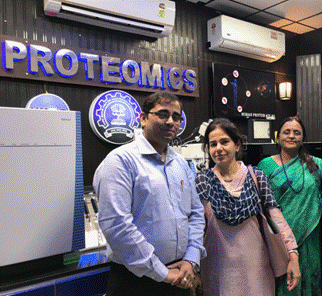Study to identify biomarkers to predict progression from non-severe to severe COVD 19 cases can help interventions
Professor Ashutosh Sharma, Secretary, DST says, “This is a very interesting approach to differentiate between the mild and severe cases of COVID-19 based on the determination of biomarkers…… If successful, it could help both in advanced diagnostic and therapeutic strategies”
The Science and Engineering Research Board (SERB), a statutory body under the Department of Science and Technology (DST), will support exploration of metabolomics alteration in COVID-19 infected patients conducted by IIT Bombay in collaboration with some hospitals in Mumbai.
The study will identify potential biomarker candidates to predict progression from non-severe to severe COVID-19 conditions. Search for potential diagnostic candidates will involve metabolite profiling of different patient groups with various complications.Metabolites are small biomolecules, capable of regulating various pathways in all the living-organisms.
Dr.Sanjeeva Srivastava, Professor at IIT Bombay,withthe expertise of using state-of-the-art mass spectrometry-based technologies, has teamed up with Dr. Om Shrivastav, Director, Infectious Diseases, Jaslok Hospital, Mumbai and Dr. Jayanthi S. Shastri, Professor & Head (Microbiology) T N Medical College & Nair Hospital and Dr. Mala Vinod Kaneria, Infectious Disease Specialist at Kasturba, Nair &Jaslok Hospitals, for this research. An advanced mass spectrometry-based national facility equipped with hybrid and tribrid mass spectrometers will facilitate the analysis of nasopharyngeal swab andplasmasamples. A team of over 20 researchers having expertise in handling a large number of different types of human biospecimens for proteomics and metabolomics investigations will work on it.
“This is a very interesting approach to differentiate between the mild and severe cases of COVID-19 based on the determination of biomarkers fromdetailed metabolome or proteome investigations. If successful, it could help both in advanced diagnostic and therapeutic strategies,” said Professor Ashutosh Sharma, Secretary, DST.
The study will include COVID-19 confirmed patients with mild and typical respiratory tract symptoms as non-severe group and patients with respiratory distress or multi-organ failure as severe groups. Patients with flu symptoms and RT-PCR negative will serve as controls. The comparison of metabolomics between these groups in terms of severity with the help ofthe patient’s plasma and swab samples will be a novel approach to understand the progression of infection and also assess changes in the metabolite profile of the host. By identifying potential markers to distinguish the patients based on severity,the study can help find novel targets for therapy.
A number of research groups are working globally on COVID-19 problem, and most of these studies have been restricted to cell-line based investigation. However, detailed metabolome or proteome investigation of COVID-19+ patient clinical samples needs to be done to provide novel cues of COVID-19 severity.
Investigation of different patient groups having mild to severe symptoms will provide early cues to identify an asymptomatic group of patients and understandinginfection mechanism and the difference between severe cases of COVID-19 from non-severe ones in terms of biological pathways. This might be helpful for future therapeutic interventions.
For more details, please contact: Dr.Sanjeeva Srivastava, IIT Bombay, Email: sanjeeva@iitb.ac.in, Mob: 9167111637

Dr. Sanjeeva Srivastava, Dr. Mala Vinod Kaneria, and Dr. Jayanti Shastri (in picture from left to right).
****
KGS/(DST)